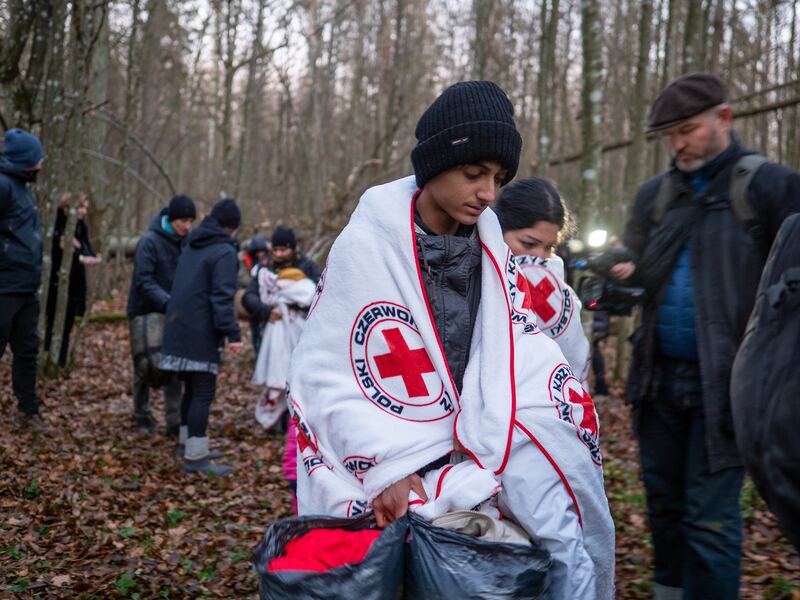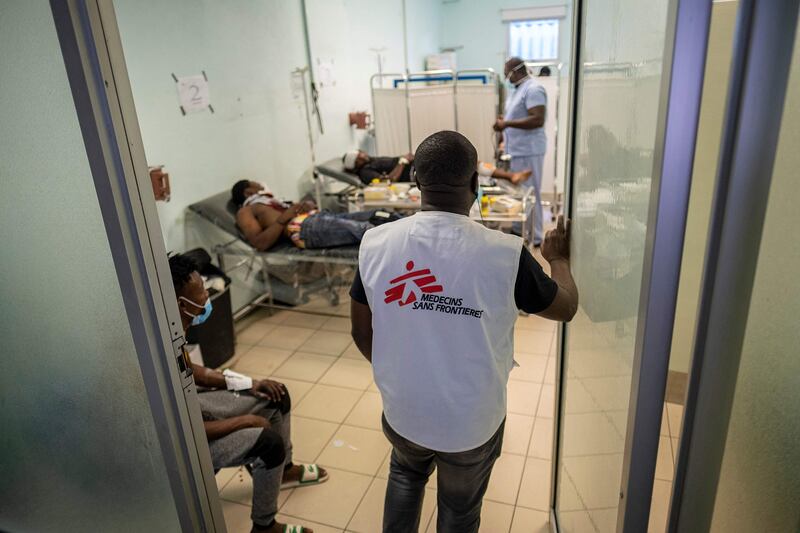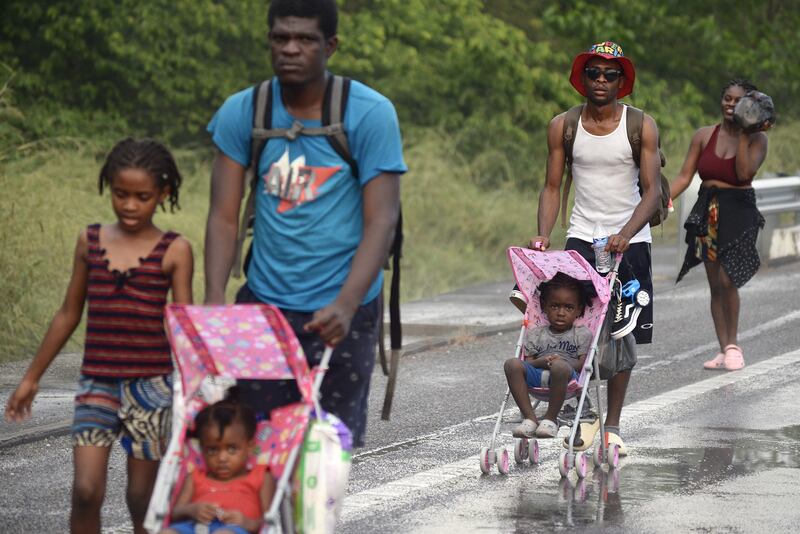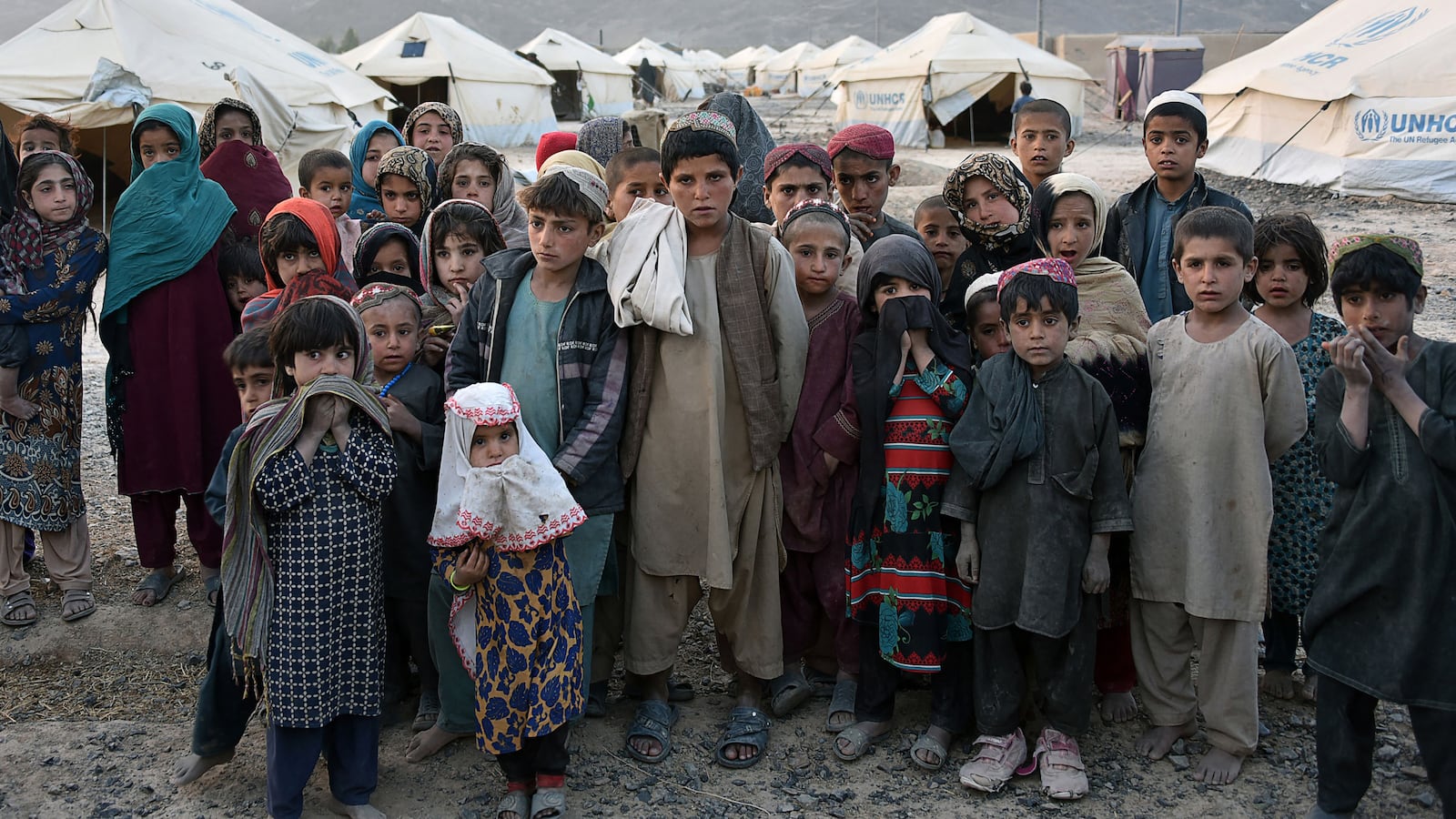This month, 10 people were found suffocated to death in the bottom of a desperately overcrowded boat taking on water off the coast of Libya, Médicins Sans Frontières reported. And international attention has turned to the Poland-Belarus showdown at their border, not least because of the thousands of migrants caught up in the middle of what appears to be a deliberately manufactured crisis, who were stranded in the wild in freezing temperatures and subjected to the use of water cannons and tear gas by military forces. Elsewhere, the drastically spiraling Afghanistan situation is about to become “the worst humanitarian crisis on Earth,” according to the director of the World Food Programme.
According to data compiled by UNHCR earlier this year, there are currently 79.5 million unavoidably displaced people around the world. Of those, 26.3 million—half of whom are under 18 years old—are counted as refugees, having been forced to flee their country due to violence or threats of persecution. They are unable to return home, and many of them live day-to-day in a kind of limbo, stuck in hastily constructed encampments in freezing forests in Belarus or along barren stretches of the Pakistan border.

NAREWKA, POLAND—Youths warm themselves with Red Cross blankets provided by Grupa Granica organization. A refugee family of 17, including nine children from Dohuk, Iraq, spent 17 days in a forest on Belarus-Polish border.
Jana Cavojska/SOPA Images/LightRocket via Getty ImagesThat’s where Giving Tuesday comes in. The first Tuesday after Black Friday, #GivingTuesday was conceived back in 2012 as an initiative to think about others during the bustling holiday season. The phrase “now more than ever” is an effective cliche for a reason—between older ongoing crises, like the Rohingya continuing to face atrocious persecution and Syrians escaping the brutal civil war, and the ones begun in 2021, it’s time to lend a hand.
In the spirit of the ninth annual Giving Tuesday, Nov. 30, unleash your generosity. The idea that one person—you—can do a lot with just a little is still a pretty radical one, in every sense of the word. You can donate your time, your money, or simply your voice to any of these worthy organizations helping people displaced across the world this year.
Well-known for providing aid all over the world, the International Federation of Red Cross and Red Crescent Societies (IFRC) is one of the most well-regarded organizations when it comes to helping ease refugee crises. A particular priority right now is coordinating with the Belarus, Polish, and Lithuanian Red Cross branches, supplying them with emergency funding to support the migrants at the Belarus-Poland border with food, water, blankets, and warm clothes. The local teams are also providing refugees with first aid and helping them trace family members.
Save the Children is another highly vetted, top-rated agency that works to deliver immediate humanitarian aid to migrant children and their families. They deliver necessary materials like hygiene kits and diapers to crisis hotspots both inside the U.S. and around the world, from New Mexico transit shelters to Syrian refugee camps.
The International Rescue Committee is dedicated to aiding people whose lives have been shattered by conflict, helping them to survive and rebuild. The IRC has executed a laser-focused effort in Afghanistan since 1988, providing families with cash assistance, mobile clinics, and education. Local chapters of the IRC are also looking for volunteers to welcome and help integrate Afghan families immigrating to U.S. communities.

Medical personnel from a Doctors Without Borders medical facility enter the triage area during a general strike in Port-au-Prince, Haiti, Oct. 25, 2021.
Ricardo Arduengo/AFP via Getty ImagesMédicins Sans Frontières, also known as Doctors Without Borders, is another household-name charity with an unshakeable track record of providing medical and mental health care structures to refugees. Amid deteriorating camp conditions, Rohingya refugees are contending with an unprecedented and invisible anxiety and depression crisis, in addition to the basic challenges of securing access to food, water, and shelter. MSF has carried out more than 1.3 million patient consultations with these refugees since the widespread and targeted violence against them began in Myanmar.
A Guatemalan initiative to protect vulnerable migrants crossing Central America, El Refugio de la Niñez works closely with the United Methodist Committee on Relief, a U.S.-based charity given a coveted grade of ‘A+’ by watchdog CharityWatch. Together, the groups get food ration packets, water, and face masks to women, children, and families passing through Guatemala as they make the journey from their homes to the United States. Climate refugees, like those from Honduras affected by 2020 hurricanes Eta and Iota, are currently receiving emergency protection and resources as a result.

A migrant caravan, mostly made up of Haitians, advances on the southern coasts of Chiapas for the fourth consecutive day as they head to the United States through Escuintla, Mexico, on Nov. 20, 2021.
Jacob Garcia/Anadolu Agency via Getty ImagesICNA Relief, with a full score of four stars from Charity Navigator, empowers and transitions refugees with dignified and highly organized help all over the world. Its Canadian branch has a particularly powerful strategy to help the persecuted Uighur population, driven from China into countries like Turkey. With volunteers and donations, the organization has been able to provide orphan sponsorship, student scholarships, and widow support.
Nominated for the Nobel Peace Prize in 2018 and 2019, ShelterBox USA is a disaster relief organization that provides emergency shelter and supplies in an attempt to bring hope and a sense of normalcy to desperate people. Right now, for example, you can donate towards its Syrian refugee response, which has already helped more than 400,000 people in the region.
Finally, especially after harrowing images emerged of border patrol officers corralling Haitian migrants on horses and appearing to whip at them, many are looking to send aid directly to the Texas border. In that case, you may want to consider the Texas Civil Rights Project or Houston Haitians United. The TCRP secures legal advice and translation services for stranded and detained refugees, while HHU, which has been around since 2015, has dedicated itself to providing resources for the Haitian community in Texas. (They’re also always looking for volunteers.)






